The Irish Cattle Breeding Federation (ICBF) held the second meeting of industry stakeholders in Tullamore last Thursday 22 February. The meeting was held against the backdrop of a small farmer protest which took place outside the meeting.
The big change that ICBF came to the meeting on was cow weight. The well-flagged change will see no bonus or increase in the replacement index for very light cows under 450kg.
The basis for this is that any cow weighing under 450kg would be unable to produce a carcase that would meet a carcase specification of 280kg.
Discussion took place at the meeting on very heavy cows and how they would be treated in the database and this was referred to the technical advisory group (TAG) for further study.
The meeting also agreed that ICBF would look into the possibility that it could develop a standalone sub index for weanling production.
It was also agreed to look at cow maintenance costs in low-cost extensive systems and see whether the Teagasc model used to generate the values in the indexes reflect what is happening on these extensive farms.
Some discussion also took place around the issue of including carbon in the index. There was unanimous support for taking carbon out of the index.
However, ICBF said it would be slow to do this and again referred it to the TAG for discussion around breaking it out into a stand-alone sub-index.
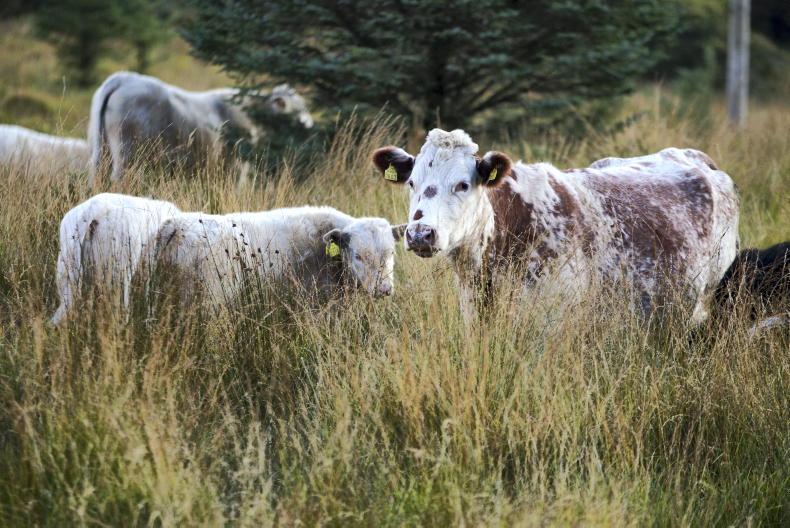
Suckler cows grazing near the Wicklow Gap in the Wicklow Hills.
The Suckler Carbon Efficiency Programme (SCEP) remains a big sticking point with pedigree breeders particularly exercised about young bulls coming to spiring breed society sales that were SCEP-eligible in September but were downgraded on the November run when all the changes were included.
Solutions
Solutions have already been found for females and AI bulls but no solution has been found for pedigree bulls being sold for breeding this spring.
Pedigree breed societies backed by farm organisations looked for a special dispensation to be made for pedigree breeders. This question was put to the minister in a phone call at Thursday’s meeting with an answer required by close of business on Friday.
If the minister didn’t respond a meeting was to take place last Tuesday 27 February.
Chair Paul Dillon communicated to stakeholders on Monday evening that no response had been received from the minister and that Tuesday’s meeting was to be postponed until Friday 2 March.
Reaction of the farm organisations
Brendan Joyce, INHFA national council
“From the very outset we felt that the star ratings are not suitable for the suckler herd. A one-size-fits-all approach cannot work. This position is now vindicated with a SCEP scheme where we have two out of three farmers who were unable to apply for SCEP.
“Over 80% of the suckler herd is stocked on an extensive basis and the ICBF model isn’t taking account of this. We are in support of ICBF using sub-indexes to use the data properly but we also need a complete re-evaluation of the Teagasc model.
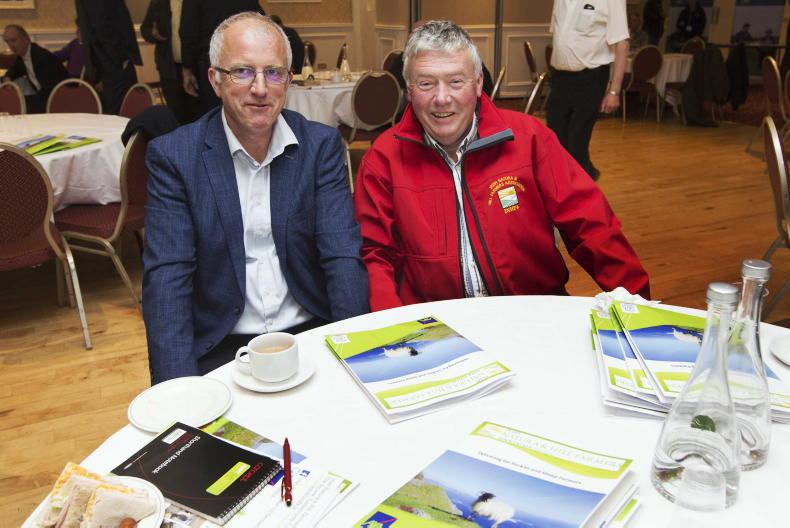
Brendan Joyce, Connemara, left, with John Flynn, Williamstown, Galway. \ Brian Farrell
“We highlighted these issues before this SCEP scheme was launched. This isn’t about setting one breed against another, it’s about getting the right model that represents a lot more farmers.
“We can’t use bad science to determine the roadmap for the suckler herd.
“We can’t take away stars at this stage of SCEP but we can soften the criteria to make sure we don’t take away supports from the farmers who joined the scheme in good faith. You can’t change the position of the goalposts halfway through a match.”
Declan Hanrahan,
IFA livestock chair
“The second meeting of the ICBF stakeholder forum resolved some issues and set a direction of travel on others to resolve the genuine concerns of suckler farmers and pedigree breeders with the indices.
“It’s critical the Minister for Agriculture Charlie McConalogue addresses the remaining issues with SCEP eligibility in advance of upcoming sales to ensure the forum has the time and space to comprehensively resolve the concerns with the indices.
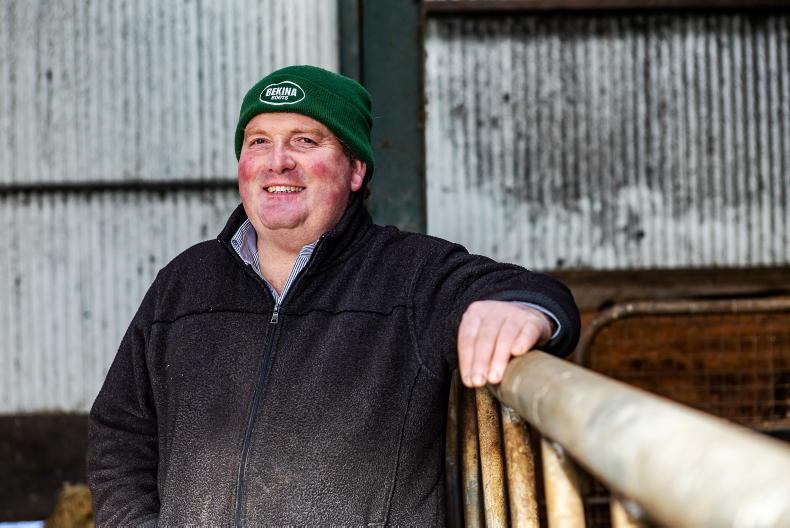
Declan Hanrahan.
“The minister has announced a number of important concessions for animals for SCEP eligibility and the final piece required relates to the movement of animals off-farm, while retaining SCEP eligibility in their new herds.
“Agreement has been reached on the inclusion of a minimum weight for cows in the index, reviewing the carbon piece and commencement of work by Teagasc on assessing the key factors and costings on weanling producing farms.
“Submissions will be taken on the upper weights issue and specifically on pedigree females to assess concerns and proposals in these areas.
“The IFA is seeking an index that fully reflects weanling production, the phasing out of the stars and continuing with a thorough examination of all components of the current indices in terms of inclusion, weighting and data sets used.”
Jimmy Cosgrave,
ICSA suckler chair
“The SCEP is in disrepute – it got off to a poor start with the frustration over compulsory SBLAS membership – and about two-thirds of suckler farmers are not in it. The problem now is that those who are in it are rapidly getting disillusioned.
“The latest meeting saw some considerable effort to get all animals bought by farmers accepted for the SCEP under the old ratings system.
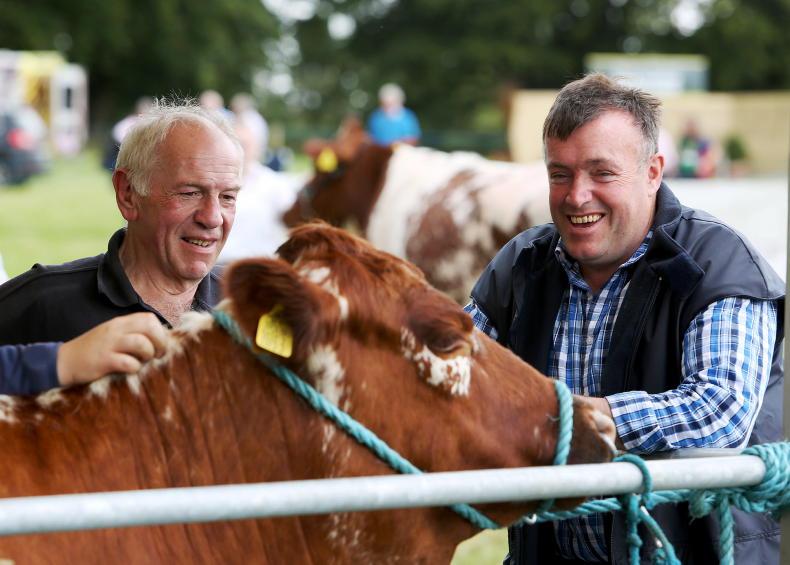
Jimmy Cosgrave, right.
“In our view, this is necessary but it’s not addressing the fundamental points. These are that the increased focus on carbon at the expense of breeding a high-value suckler weanling will do nothing for suckler profits and it attributes excess blame to the less intensive suckler system for global warming. ICSA rejects that premise.
“The second key point is that when the top 25 replacement index bulls are dominated by Angus and heavily weighted against the main suckler cow breeds such as Limousin, Charolais and Simmental, then there is something fundamentally wrong.
“ICSA believes there is an urgent need for a complete revamp of the ICBF board, which is top heavy with dairy farmer representatives. This, we believe, goes some way to explaining why we are in the mess we are in.”
The Irish Cattle Breeding Federation (ICBF) held the second meeting of industry stakeholders in Tullamore last Thursday 22 February. The meeting was held against the backdrop of a small farmer protest which took place outside the meeting.
The big change that ICBF came to the meeting on was cow weight. The well-flagged change will see no bonus or increase in the replacement index for very light cows under 450kg.
The basis for this is that any cow weighing under 450kg would be unable to produce a carcase that would meet a carcase specification of 280kg.
Discussion took place at the meeting on very heavy cows and how they would be treated in the database and this was referred to the technical advisory group (TAG) for further study.
The meeting also agreed that ICBF would look into the possibility that it could develop a standalone sub index for weanling production.
It was also agreed to look at cow maintenance costs in low-cost extensive systems and see whether the Teagasc model used to generate the values in the indexes reflect what is happening on these extensive farms.
Some discussion also took place around the issue of including carbon in the index. There was unanimous support for taking carbon out of the index.
However, ICBF said it would be slow to do this and again referred it to the TAG for discussion around breaking it out into a stand-alone sub-index.

Suckler cows grazing near the Wicklow Gap in the Wicklow Hills.
The Suckler Carbon Efficiency Programme (SCEP) remains a big sticking point with pedigree breeders particularly exercised about young bulls coming to spiring breed society sales that were SCEP-eligible in September but were downgraded on the November run when all the changes were included.
Solutions
Solutions have already been found for females and AI bulls but no solution has been found for pedigree bulls being sold for breeding this spring.
Pedigree breed societies backed by farm organisations looked for a special dispensation to be made for pedigree breeders. This question was put to the minister in a phone call at Thursday’s meeting with an answer required by close of business on Friday.
If the minister didn’t respond a meeting was to take place last Tuesday 27 February.
Chair Paul Dillon communicated to stakeholders on Monday evening that no response had been received from the minister and that Tuesday’s meeting was to be postponed until Friday 2 March.
Reaction of the farm organisations
Brendan Joyce, INHFA national council
“From the very outset we felt that the star ratings are not suitable for the suckler herd. A one-size-fits-all approach cannot work. This position is now vindicated with a SCEP scheme where we have two out of three farmers who were unable to apply for SCEP.
“Over 80% of the suckler herd is stocked on an extensive basis and the ICBF model isn’t taking account of this. We are in support of ICBF using sub-indexes to use the data properly but we also need a complete re-evaluation of the Teagasc model.

Brendan Joyce, Connemara, left, with John Flynn, Williamstown, Galway. \ Brian Farrell
“We highlighted these issues before this SCEP scheme was launched. This isn’t about setting one breed against another, it’s about getting the right model that represents a lot more farmers.
“We can’t use bad science to determine the roadmap for the suckler herd.
“We can’t take away stars at this stage of SCEP but we can soften the criteria to make sure we don’t take away supports from the farmers who joined the scheme in good faith. You can’t change the position of the goalposts halfway through a match.”
Declan Hanrahan,
IFA livestock chair
“The second meeting of the ICBF stakeholder forum resolved some issues and set a direction of travel on others to resolve the genuine concerns of suckler farmers and pedigree breeders with the indices.
“It’s critical the Minister for Agriculture Charlie McConalogue addresses the remaining issues with SCEP eligibility in advance of upcoming sales to ensure the forum has the time and space to comprehensively resolve the concerns with the indices.

Declan Hanrahan.
“The minister has announced a number of important concessions for animals for SCEP eligibility and the final piece required relates to the movement of animals off-farm, while retaining SCEP eligibility in their new herds.
“Agreement has been reached on the inclusion of a minimum weight for cows in the index, reviewing the carbon piece and commencement of work by Teagasc on assessing the key factors and costings on weanling producing farms.
“Submissions will be taken on the upper weights issue and specifically on pedigree females to assess concerns and proposals in these areas.
“The IFA is seeking an index that fully reflects weanling production, the phasing out of the stars and continuing with a thorough examination of all components of the current indices in terms of inclusion, weighting and data sets used.”
Jimmy Cosgrave,
ICSA suckler chair
“The SCEP is in disrepute – it got off to a poor start with the frustration over compulsory SBLAS membership – and about two-thirds of suckler farmers are not in it. The problem now is that those who are in it are rapidly getting disillusioned.
“The latest meeting saw some considerable effort to get all animals bought by farmers accepted for the SCEP under the old ratings system.

Jimmy Cosgrave, right.
“In our view, this is necessary but it’s not addressing the fundamental points. These are that the increased focus on carbon at the expense of breeding a high-value suckler weanling will do nothing for suckler profits and it attributes excess blame to the less intensive suckler system for global warming. ICSA rejects that premise.
“The second key point is that when the top 25 replacement index bulls are dominated by Angus and heavily weighted against the main suckler cow breeds such as Limousin, Charolais and Simmental, then there is something fundamentally wrong.
“ICSA believes there is an urgent need for a complete revamp of the ICBF board, which is top heavy with dairy farmer representatives. This, we believe, goes some way to explaining why we are in the mess we are in.”









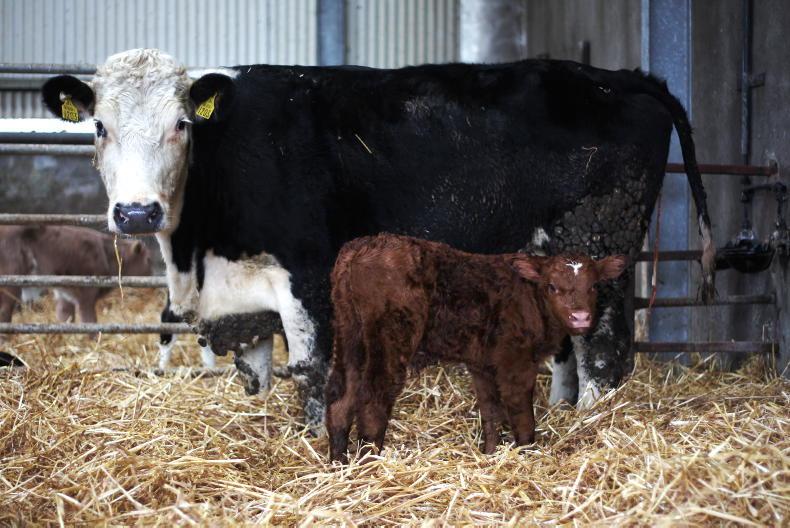

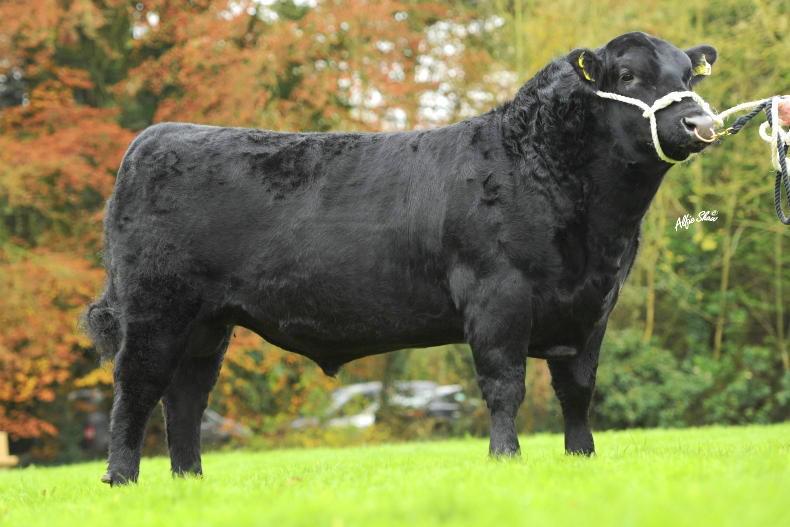
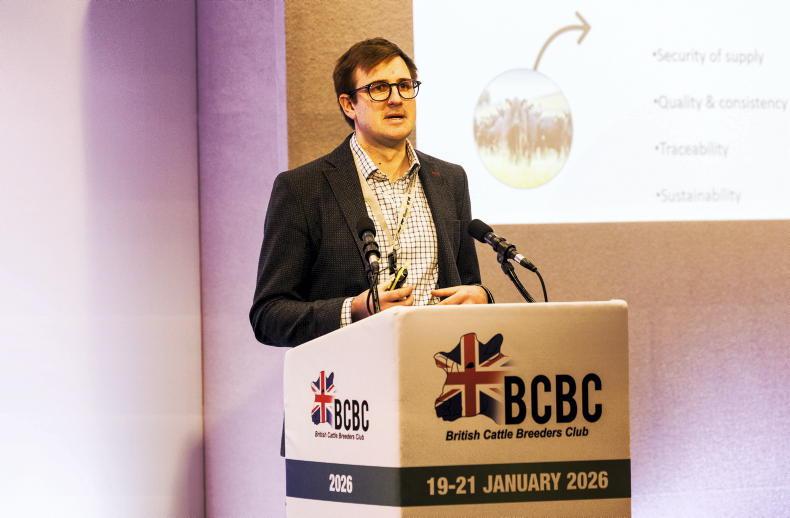
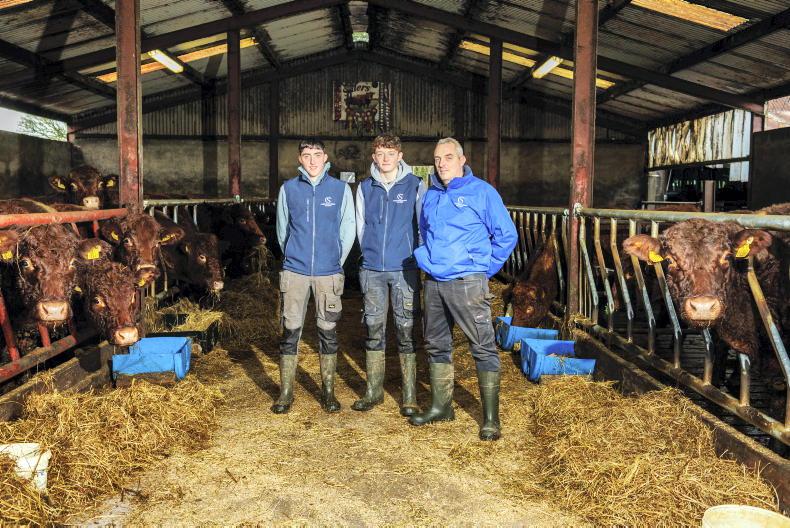
SHARING OPTIONS